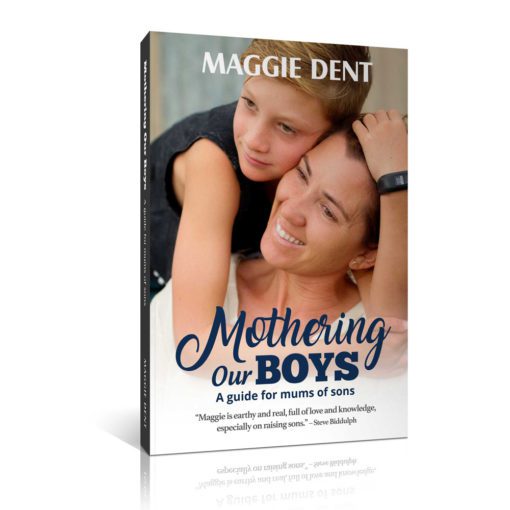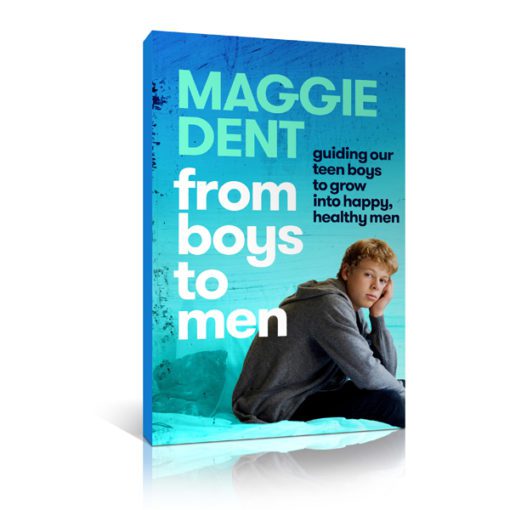Building Resilience, Newsletter Articles, Posts for Parents, Raising Adolescents, Raising Boys
How to raise our boys with character

… or rather How to raise our boys with character, who will care about themselves, others and our world.
It seems that in this busy ever-changing world we have lost sight of what is really important in raising our children. We focus so much on the grades our children achieve and their physical, musical, artistic and mental abilities that we seldom recognise or celebrate their humanity and the depth of their unique character.
It is only when we see an absence of this dimension that we bemoan the fact and complain about our young people, especially our boys and men, as we have seen with the recent #MeToo movement.
The 24/7 news cycle, endless pressure of consumerism, violent movies and gaming, pornography, celebrity ‘status’ and mindless reality TV all erode what really matters in life – which is caring relationships within human systems. Humans are social beings and human connectedness is fundamental to the well-being of all individuals.
Much of the focus of my recent bestselling book Mothering Our Boys was about the call to action to end the unhealthy social conditioning around boys as being either tough or inevitably naughty. Even though the book was aimed at mothers and mother figures, it has certainly provoked conversations around the unhelpful expectations that still exist in our homes and our schools and our communities.
When one explores the evolutionary biologists’ interpretation of early human kinship communities, it can be seen that many of the accepted ways of existing within a closed community were actually quite beneficial in the healthy raising of both girls and boys.
For example, the first approximately eight years of a boy’s life were spent surrounded by women and other children. There was always a warm breast, a welcoming lap or attentive hug available to every little boy whenever it was needed. They were marinated in the tenderness of committed females who practised collective parenting while running largely free in the circle of multi-aged children.
This was a rich formative window that nurtured the emotional and social development of all children, where they learned to play endlessly together, to share and to watch out and care for each other.
Traditional Indigenous communities also prioritised the development of character through ceremony and story that enabled individuals the foundation to create a life of meaning and purpose regardless of gender, or physical attributes or even challenges.
Today’s world is so far removed from what I have just described and yet the same developmental windows of potential still exist.
Children still need human experiences that are guided by caring adults to develop the emotional and social capacities to become adults who care about their own actions and how they impact on others.
What are the characteristics of healthy emotional intelligence that underpin good character?
A person with emotional competency would, for example, be respectful of others, have patience in queues, resolve conflict without verbal or physical abuse, be capable of loving caring relationships, overcome setbacks quicker than others, and enjoy being their authentic selves most of the time.
Boys who fail to develop these capacities will tend to struggle in relationships and they will struggle to realise their full potential. They will also tend to struggle with poor health outcomes, addictions, mental health issues, and anger and aggression.
Before we explore the practical steps to raising boys who not only can care but who will care, I must acknowledge that boys who are born at the sensitive end of the temperament spectrum — the lambs — are born with the caring gene and are often capable of being empathetic from the get go.
I was gifted with two lamb-boys who were thoughtful and considerate even as toddlers. Sometimes they worried too much about things that didn’t seem fair.
One of my lads as a six-year-old, when asked to write about the things that worried him in the world — wrote down about 10 things including people dying of cancer, plastics in the ocean, bad people who hurt children, starving children in Africa and homeless people just to name a few.
Sometimes our most sensitive little boys have the tenderness crushed out of them by toxic adults who try to convince them they need to toughen up, stop being sissies or they get crushed by endless criticism, shaming and relational aggression especially being called weak or stupid. Please be mindful if your sensitive son has a toxic teacher, or family member or sporting coach who uses these mindless and hurtful types of communication. The damage can create a defended heart and a deep sense of unworthiness that will be carried through to adulthood. It’s important to listen to your son and watch out for this. You may need to advocate for him and support him to see these people’s words and actions for what they are, rather than being a reflection on him.
Modelling kindness, empathy and good character as parents is the first base! Fairness is a huge part of understanding how to care. Dr Matthew Liebermann and Naomi Eisenberger published research to show that when we are treated fairly it ignites the same part of the brain as when we eat chocolate or have a drink of water on a hot day. It makes us feel good and so we get feedback from our brain when we are kind because it is always linked to fairness. So, ask often when your son makes a poor choice – was that fair? Cultivating an understanding of fairness early in life can be so helpful.
Helping little boys
“When a child is not given enough help with his intense lower brain feelings and primitive impulses, his brain may not develop the pathways to enable him to manage stressful situations effectively. The legacy later in life is that he will not develop the higher human capacity for concern, or the ability to reflect on his feelings in a self aware way. Brain scans show that many violent adults are still driven, just like infants, by their ancient rage/fear and defence/attack responses deep in their brain.”
— Margot Sunderland, The Science of Parenting (2007).
- Healthy attachment — The first five years are an incredibly important timeframe to build the foundations to create a caring man. Healthy attachment is essential in raising boys who will care. Endless hours of face-to-face time, being held gently, being rocked endlessly and being covered in kisses frequently all help to build the essential connection to a baby boy’s heart. Of course it is wonderful if a boy has a loving mother and father to do this, however the research shows it just needs to be a significant warm, caring grown-up who gives the boy a sense of having a ‘safe base’ in his life. Little boys are just as sensitive as little girls, and in some ways can be even more vulnerable to feeling abandoned and unloved. We need to prioritise loving little boys — often by showing rather than telling — and by dealing with their poor choices with warm discipline rather than harsh punishment.
- Model loving touch — our ‘rooster’ boys or alpha boys are often lacking in empathy and can be seen as ‘rough’ and insensitive to others. Yes they may have been born feisty with a heightened sense of their own self-importance and as roosters, they are at one end the temperament spectrum. Parents should be mindful that they need to work out how to put some lamb in that rooster before they get to school. My best suggestion around the age of three is to get a guinea pig. With careful guidance from loving grown-ups, our boisterous rooster boy can learn how to be gentle — yet it does take some time. Helping him care for that guinea pig by feeding it and cleaning out its cage is also really important to building a sense of responsibility for someone other than himself.
- Power of picture books — prioritising reading stories that have messages about empathy and kindness is another powerful step you can take early in a boy’s life.
… and good quality kids programs — Watching high quality kids’ programs that have no relational aggression – name calling, put downs or exclusions – can help too. ABC’s Play School, Sesame Street, Bluey, Bing and even Peter Rabbit are all safe! - Avoid all apps that offer rewards – they are priming our children to becoming gamblers and boys are especially sensitive to wanting to win or see that they have ‘done good’! Also avoid screens for as long as possible — keep your boys immersed in a real world outside. Addiction to gaming starts young.
- Bath time and pillow chats — use bedtime and bath time to have quiet conversations decoding little experiences that may help little boys make better choices.
- Bedtime rituals — create a special bedtime ritual that shows how enormous your love is for your son … he’s likely to be spatially gifted and wants to be sure it’s a huge amount you love him.
- Family values and expectations — boys tend to have less efficient memories than girls and often simply forget what your family values may be especially in the heat of the moment when they’re having a lot of fun. Consider drawing up a very large poster with your family values in full view so that when your son makes a poor choice, you can remind him gently what matters most in your family. A great place to start is by instituting the 3 Rules.
- Prioritise kindness — When we are treated with kindness, it allows our nervous system to relax and the pleasant sensations from endorphins, often serotonin and sometimes oxytocin to flood our body. It makes us feel safe, valued and connected. Avoid stress and distress because they have significantly negative effects on how children and adults interact with the world. Consciously choose kindness often – even if it’s counter intuitive. Kindness = love to boys!
- Encourage all play including multi-age play — play is essential in the healthy development of every child and the more play with other children that little boys experience, the healthier and happier that little boy will grow to be. Research is strong on the value of outdoor play versus indoor, especially screen play. Playing with multi-aged children is especially helpful when older children are given the expectation that they can take care of younger children in play situations. Again, these simple ancient human interactions are still unbelievably important and powerful at shaping the character of all of our children. Help boys build friendships through play as proximity builds bondedness more in boys!
- Validate that big ugly feelings are OK and indeed normal — boys often struggle to articulate their big ugly feelings and often they come out as anger or in some other physical expression like kicking or hitting. Helping boys to label these emotions — well after they have had a chance to calm down — can really help them better understand themselves. Being empathetic and having the ability to tune into other people’s emotional worlds is a really big part of being fair and being kind and this can be really confusing for many boys.
“Babies and children who are raised with a culture of care, compassion and kindness will treat others the same way, and they will expect to be treated that way throughout life.”
— Maggie Dent, 9 Things: A back-to-basics guide to calm, common-sense parenting Birth-8 (2014).
Helping Boys 10+
- Consider getting a good dog — A good dog can teach empathy and compassion so much better than us humans. Often stroking a much-loved dog can reduce your son’s stress, make him feel loved and teach him to be gentle all at the same time.
- Go camping with family and friends — removing our boys from their familiar environments and allowing them to connect more deeply with other children and adults who are already a part of their lives can quite often be life-changing. Not only do such trips involve everyone helping each other out, the relaxed nature of the outing can reduce hidden stress levels in our kids. Quite often they play until they drop from exhaustion — and so much learning can happen during those days. The campfire (where permits allow!) has to be a part of these adventures as it is incredibly beneficial for learning how to be a person who cares.
- Gather around campfires or fire pits — when people gather around fire it seems to trigger a very ancient pathway of memory that sadly it seems the TV or the screen world has stolen. The fire itself has a mesmerising effect of bringing people into a mindfulness state. Listening to people share stories, tell jokes and sing songs brings a strong sense of belonging to all who are present. The sharing of true stories often about challenging experiences is one of the most powerful ways that boys learn how to be good men who care.
- Marinate boys in stories of men who care — boys are so easily influenced in the early stages of adolescence that all of us who care about them need to prioritise the witnessing and sharing of true stories of men who do good things — men who care. Check out Orange Sky Australia, set up by two young men, the Burrumbuttock Hay Runners, or Samuel Johnson’s Love your Sister charity.
- Become a lighthouse — or a mentor for a teen boy. Traditionally boys were guided into adulthood by good men who saw it as an important responsibility. When boys are left untethered in the digital world without the guidance of good men, they are struggling to find their way to manhood. So many are doing what they are instinctually wired to do — hunting, doing risky stuff and trying to win —, but not with others especially older wiser men. Obsessive gaming is stealing our boys’ minds, hearts and souls. Good women can also be a positive influence on our often-confused adolescent boys. The more people who genuinely care for them the better.
- Community involvement — many of our boys are growing up in their bedrooms in their digital communities. This means many of them lack the important growth and development that comes from being a part of a community. Many are struggling with social anxiety as they appear from their bedrooms in their late teens and early 20s because navigating the social nuances of life takes lots of experience. Help your boys be involved in something — anything from organised sport, drama or the arts, environmental volunteering, animal refuges, community or vege gardens, or simply helping their neighbours or their grandparents. Every single interaction makes them feel better about themselves and they will get that caring does matter.
- Stop access to the harmful and hurtful aspects of the digital world — do everything you can to educate your son about how to navigate this crazy world with healthy boundaries. Ensure you have parental controls that go with him when he leaves the house. Talk to him about pornography and also make sure you have conversations about what respectful relationships and consent look like (you can start these chats under 10 too). Encourage your son to become an invisible guardian to protect friends and family. Explicitly outline what is not acceptable and create an agreement he has to commit to and sign.
- Rites of passage — traditional kinship communities would all have a rite of passage for young people as they ventured into adulthood to help boys and girls accept the ending of boyhood and girlhood. There are many excellent programs now being run in schools and in communities including the wonderful work of Dr Arne Rubinstein’s Rites of Passage Institute and Andrew Lines’ The Rite Journey. Other programs include Fathering Adventures, The Fatherhood Project, Youth Flourish and many more. These are all Australian organisations but whatever country you’re reading this from, you will find similar organisations doing this work.
- Help get high-quality programs into schools for teen boys — around the ages 13 to 15 teen boys are highly impressionable and easy to influence. Sadly this is when we are losing so many of them to a digital world of gaming and pornography and so much of that is based in aggression, violence and an inappropriate use of power especially against women. This window of sensitivity is largely biologically driven due to a massive increase in the number of dendrites in the brain. If boys are immersed in positive experiences they will become very different men to those who are immersehttp://www.fatherhood.com.au
- d in the opposite. When boys are given an opportunity to be heard and to have some of their unhealthy perceptions deconstructed in a warm manner, they can be changed for life. It is my dream that every single boy in middle school will have the opportunity to experience the high quality programs that are offered by organisations like Enlighten Education’s Goodfellas’ program, Tom Harkin’s work and the Man Cave. Again these are Australian but there are many such similar groups around the world.
- Reading to boys in high school – I discovered as a relief teacher that boys could be really moved by a true story read by an adult. I carried a Chicken Soup for the Soul book for those days when I finished a lesson early and I was staggered with how often it was the boys that asked for a story rather than the girls. The stories they wanted were often quite challenging, especially a story like Bopsy about a boy with leukaemia who wanted to grow up to be a fireman. So many of these stories featured somebody who cared and it really touched their fragile aching hearts and there were many times boys would wipe away tears and put their head on the desk. Please keep reading or telling boys true stories that open their hearts.
- Surround boys with adults who care – Seriously, what is shown in the media are the worst examples of humanity and with our 24/7 news cycle we see these awful things instantly, frequently and in high-techno colour. Boys are generally highly visual and kinaesthetic so we simply need to have right in front of them, as often as possible, real examples of positive human interaction with decent people who care. We need to care as family — as aunts, uncles and grandparents. We need to care as community members — as bus drivers, shopkeepers, pool attendants, police officers and health workers. Finally we need to have enough caring teachers who prioritise relationships above grades and endless assessments. We need to help boys feel that they matter and that we genuinely care about them even when they stumble and fall.
“The best way to inspire your children to develop into the kind of adults you dream of them becoming is to become the kind of adult you want them to be.”
— Robin Sharma, The Greatness Guide (2006).
We can raise all our boys, both our roosters and our lambs and everything in between to be caring when it matters.
It is not just one thing that builds the capacity to care in our boys, is the combination of many things done collectively with an intention to build the character that hides within every one of them.
We certainly don’t want any of our boys to lose themselves on the pathway to manhood and we want them to care about themselves, others and the world around them.
If our boys can do this they will be able to give themselves three of the wonderful important gifts they yearn to have – respect, acceptance and unconditional love. If this could happen for every boy imagine how different our world be?
more on this in maggie's books on boys...
Image credit: ©️ Mila Supinskaya /Adobe Stock – stock.adobe.com




 Manage Membership
Manage Membership

